Meet NajibAI, the new AI tool that helps M’sians track their expenses on WhatsApp
With the New Year fast approaching, it got me thinking about annual resolutions again. Some people aim to eat healthier and work out more, but for me, it’s about managing my finances better.
One way I’ve been attempting to achieve this is by tracking my spending. The only problem? Manually logging in the data gets too tedious, and I end up giving up. I’ve tried apps, sheets, and even jotting it down in physical notebooks—nothing works.
But I recently came across NajibAI, which could be a game changer for struggling folks like me.
Using AI to keep your spending habits in check
Created by Malaysian founder Dylan Tan, NajibAI is a chat-based WhatsApp artificial intelligence (AI) to record your receipts and track your spending.
It’s one of the few free tools that Dylan’s company, Replyr.ai (a firm that helps turn WhatsApp chats into paying customers using AI), makes.
“As a fun side project, I created NajibAI, a free WhatsApp tool that helps Malaysians manage their expenses,” Dylan shared with us. “It’s a tool for Malaysians, by a Malaysian, to make tracking spending easy, practical, and a bit more fun.”
Anyone can try it as long as you have a WhatsApp account. All you have to do is snap a picture of your receipt, send it to your chat with NajibAI, and he’ll enthusiastically help store your records for you.
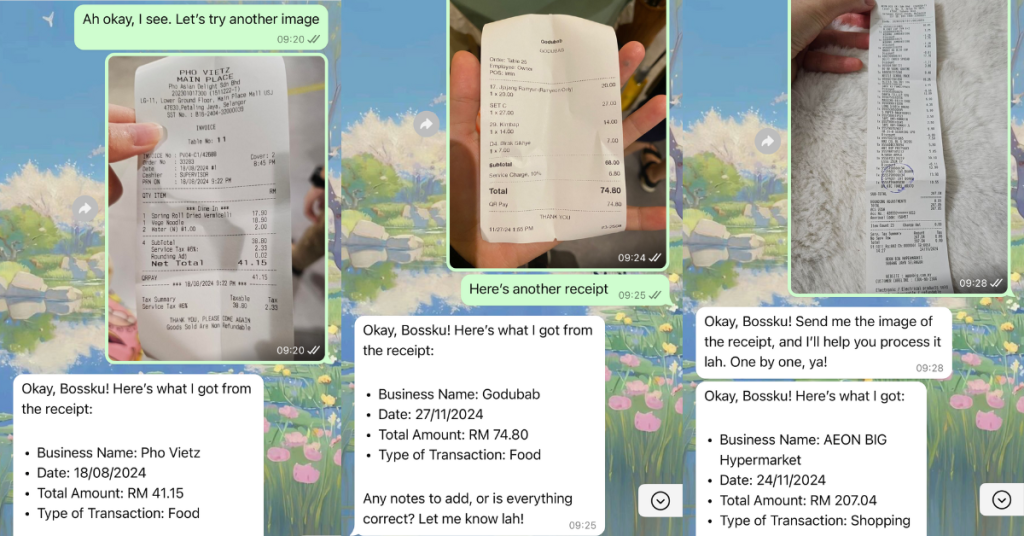
Currently, NajibAI only tracks a few key elements in the receipt:
- Business name
- Date of transaction
- Total amount spent
- Type of transaction (e.g. food, shopping, etc.)
Upon receiving the photo, NajibAI will extract these details from the receipt and share them with you for double-checking. This will then be stored in NajibAI’s memory bank once you’ve confirmed the details.
You can also add notes to the receipt’s record for your future reference. Based on the key elements, you can request a rundown of your spending habits, which is what I personally find the most useful.
For example, if you want to find out how much you’ve already spent on food this month, you can just ask NajibAI.
Another nifty thing about this WhatsApp-based AI tool is that it works for receipts in any language and any currency. This makes it convenient for when you’re travelling abroad and want to stick with a set vacation budget.

I was initially sceptical about this claim, but I’ve tried it with a few foreign receipts online in languages like Mandarin, Russian, and even Greek. NajibAI was able to extract all the key information without a hitch, for the most part, but it doesn’t necessarily localise the business’s name or currency used in the receipt.
As the tracker is still in Beta testing, it’s not always perfect. Some occasional hiccups I’ve noticed are problems in extracting the business name (especially if it’s in a non-Latin language) and getting the total amount spent confused.
The response time of the chat-based tool is also slightly slower than what I’m used to, typically averaging five to 10 seconds before replying. However, these are just minor issues that can be improved with tweaks.

Is data and privacy something to worry about?
A bigger, more pressing concern would actually be about data and privacy since it’s a WhatsApp-based tool.
To this, Dylan reassured that interacting with NajibAI is no different from messaging any other business on WhatsApp. “Everything happens within WhatsApp’s secure environment. We don’t link receipt data back to personal identities, and the system operates within WhatsApp’s privacy guidelines.”
That said, he’s actively working on adding more transparency features to give users better visibility and control over their data. Just today, he rolled out a new feature allowing users to request their data to be deleted by simply asking NajibAI.
“I don’t foresee significant legal issues since NajibAI operates within WhatsApp’s terms of service. However, I’m keeping a close watch on feedback and I am ready to adapt if users or other stakeholders raise concerns. The goal is to maintain trust and operate responsibly while keeping this helpful tool free for users,” Dylan stated.

As for why he chose WhatsApp, it comes down to user convenience. It’s no secret that WhatsApp is a platform that many Malaysians use on a daily basis, so Dylan figured it would make the most practical sense.
He believes managing expenses can feel more natural when done in a space that people already associate with communication and sharing images.
That said, NajibAI is a glimpse into what’s possible with AI and plays a role in what Replyr.ai is building. Its main business focuses on automating sales on WhatsApp for businesses, using AI agents to perform actions like collecting payments, updating CRMs, and scheduling appointments.
Hopping on the “Bossku” train
Now let’s address the elephant in the room… Why the name Najib?
“I chose the name as a playful nod to Malaysian pop culture. Bossku has become part of our everyday slang, and I wanted NajibAI to feel approachable and local,” Dylan explained. “It’s just a fun, relatable way to make expense tracking more interesting.”
While you may think it’s referring to a certain someone, the founder reaffirmed that there’s no explicit reference to anyone.
As for legal concerns, he’s done his due diligence to ensure there’s no defamatory content or explicit association. “It’s really just [about] creating a light-hearted interaction [more] than anything else. Managing expenses is boring, but NajibAI adds a bit of Malaysian humour into the mix,” he said.

This is actually one of the key lessons he learnt with his previous creation called AhBengGPT, a chat-based game powered by ChatGPT, where players try to negotiate for an iPhone from a Malaysian Ah Beng phone seller.
“AhBengGPT taught me the importance of keeping interactions fun, engaging, and uniquely local. Malaysians appreciate humour and relatable touches, which is why NajibAI leans into the ‘Bossku’ term, just like how AhBengGPT would speak with really strong Malaysian slang,” he shared.
To help more Malaysians manage their expenses better, Dylan intends to keep NajibAI free for everyone to use. It comes at a small cost for Replyr.ai, but he’s more interested in providing its larger benefit to more people.
For now, he’s focused on learning how users interact with the AI and refining the user experience from there.
Also Read: 3 benefits your tech startup will gain from joining MRANTI’s Supercharger Series, explained
Featured Image Credit: Dylan Tan / Vulcan Post
Celebrating Ananda Krishnan: 5 lesser-known facts on the late 6th richest M’sian billionaire
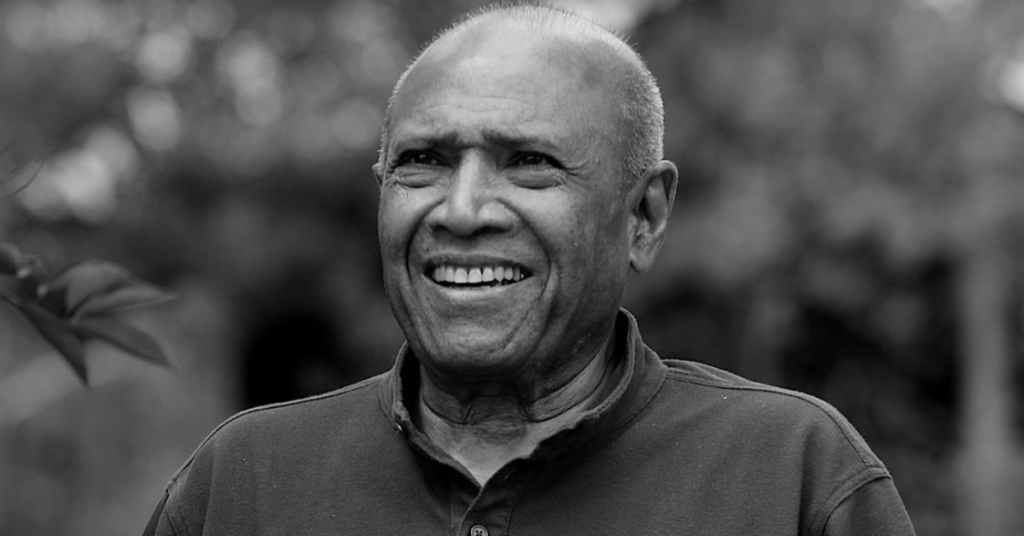
Malaysia’s sixth richest man Ananda Krishnan has died on November 28, 2024 at the age of 86.
At the time of his death, he was estimated to have a net worth of US$5.1 billion according to Forbes, making him the 671st wealthiest person in the world.
His wealth was primarily accumulated through his role as the founder and chairperson of Usaha Tegas, the founder of Astro Malaysia Holdings, as well as the founder of Yu Cai Foundation (YCF).
A notable and forward-thinking businessman, Ananda was one of few who moved out of the old economy of oil trading and property development to the new economy of telecommunications and entertainment. Aside from Astro, his multimedia empire also includes Maxis, MEASAT, and many more.
Despite his stature, Ananda Krishnan is known to be a reclusive individual, often shunning public exposure and opting for a low profile instead.
As such, little is known about his personal life beyond his business. But as we celebrate his life and legacy, here are some lesser-known facts about the Malaysian businessman that have emerged over the years.
1. He majored in political science
Although his affinity seems to lie in business, Krishnan actually has a deep interest in politics, and actually got his Bachelors of Arts degree majoring in political science.
When he became a founding director of national energy giant Petronas in the 1970s, Krishnan forged close ties with our country’s political elite, such as former prime minister Mahathir Mohamad.
2. He played a role in the establishment of Petronas Twin Towers
The businessman supposedly played a pivotal role in the development of iconic landmarks such as the Petronas Twin Towers.

He apparently sold Dr Mahathir the idea of building the twin towers in the early 1990s.
The Edge reported that Tun M then handpicked Ananda Krishnan to lead the development of the Petronas Twin Tower and the surrounding KLCC development.
3. His son is a Buddhist monk that renounced his wealth
Krishnan was actually a follower of Buddhism, a belief that his only son, Ven Ajahn Siripanyo, followed. Siripanyo actually made the decision to become a Theravada Buddhist monk at the age of 18, The Economic Times reported.
He is one of two children from Krishnan’s first marriage to a Thai princess.
For over two decades, Ven Ajahn Siripanyo has been living as a forest monk, primarily based at the Dtao Dum Monastery near the Thailand-Myanmar border.
It’s unclear who will inherit the billionaire’s wealth, but it likely would not be Siripanyo.
4. He gained popularity through Live Aid
It’s said that Krishnan first came to public prominence by helping to organise the Live Aid concert in the mid-1980s.
Live Aid is a legendary charity concert, put together by Irish rock star Bob Geldof.
A multi-venue benefit concert, the 1985 concert sought to raise further funds for relief of the 1983–1985 famine in Ethiopia.
According to Forbes, Krishnan raised US$240 million for the concert and cause.
5. He’s recognised as a notable philanthropist
As presented in the previous point, the billionaire was quite the charitable man.
Aside from Live Aid, Ananda Krishnan donated to education, the arts, sports, and humanitarian causes in Malaysia through his company Usaha Tegas, and its subsidiaries.
Specifically, Krishnan’s Usaha Tegas launched the Harapan Nusantara education fund, which has sponsored 100 students a year since 2004 to attend special programmes at local private universities that collaborate with foreign universities.
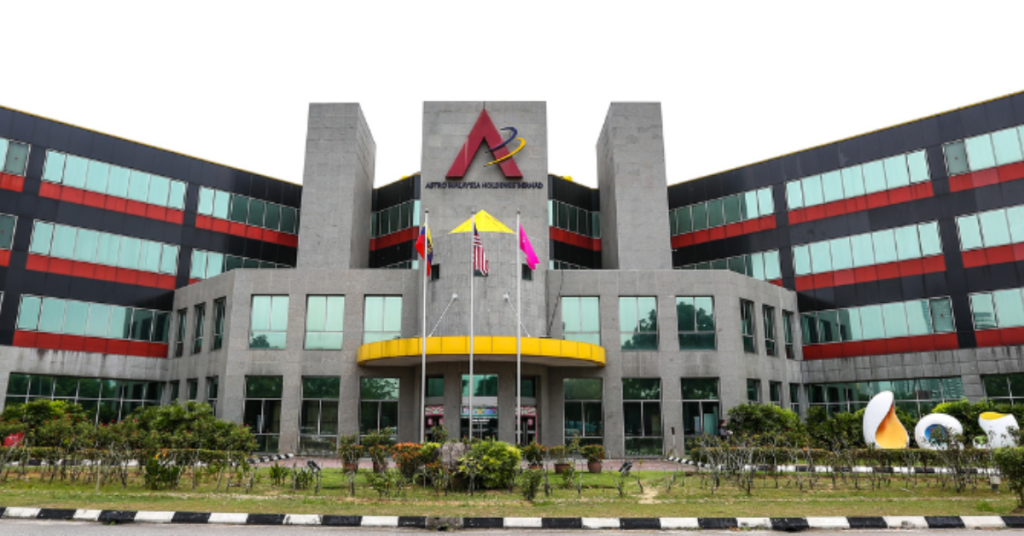
There’s also the Yu Cai Education Foundation with a grant of US$6.6 million to help ethnic Chinese groups. Astro also had a scholarship programme that devoted an annual RM2 million to support promising Malaysian undergraduate and graduate students studying media and broadcasting.
All of these—along with numerous other initiatives, is why Krishnan was recognised on the Forbes list of Asia’s Heroes of Philanthropy in 2010.
-//-
Of course, the billionaire’s life wasn’t unmarred by criticisms, having been involved in various scandals of alleged corruptions as well as reported bailout of 1MDB, among other issues.
Regardless, there’s no two ways about it—Ananda Krishnan has left not just a mark on Malaysia’s business world, but on the very fabric of our nation.
His businesses are household names that many of us rely on every day. His work is quite literally marked in our capital city’s skyline. His charitable efforts have impacted more lives than many of us could ever fathom.
Although Krishnan was always a private figure, his acts of service greatly benefited the Malaysian public. May he rest in peace.
- Read articles we’ve written about Malaysian startups here.
Also Read: Mega sales are coming up in M’sia, here’s how to ensure that your parcels don’t go missing
Featured Image Credit: Bernama
Malaysia’s logistics sector just got safer with the launch of Volvo’s new trucks, here’s how
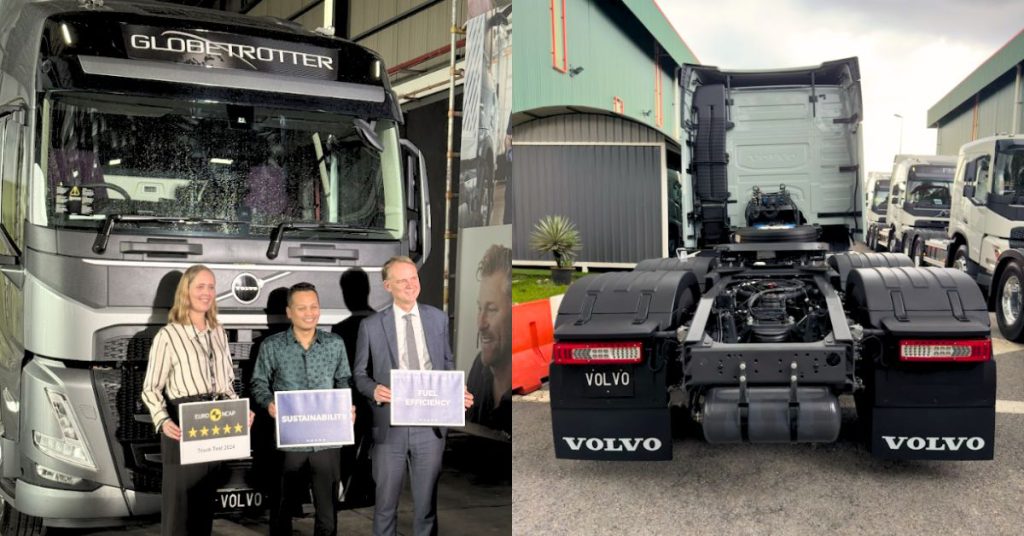
Trucks get a bad rap for being intimidating road companions, but looks like Volvo is trying to flip that narrative with its safety technologies.
Not only that, but Volvo Malaysia Sdn Bhd’s (Volvo Trucks) latest range of heavy-duty trucks are also designed to revolutionise Malaysia’s logistics industry by boosting fuel efficiency and reducing carbon emissions.
With a focus on safety and sustainability, the new models align with the country’s growing need for greener and safer transportation solutions.
“Safety is at the heart of what we do,” Volvo Trucks Southeast Asia and Japan Managing Director Anna Engblom said in a press release. “These new trucks are engineered to protect both drivers and road users while addressing environmental challenges.”
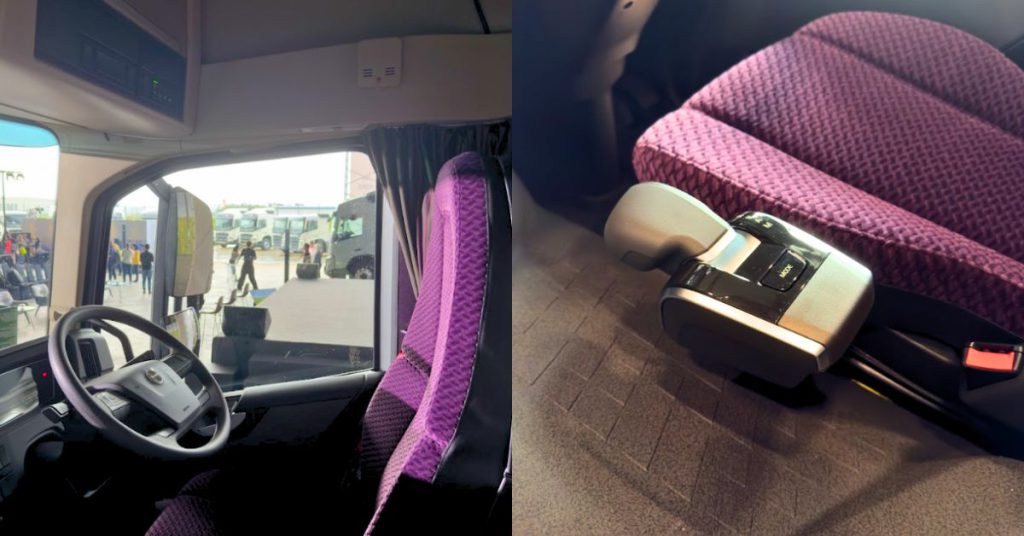
Like modern cars today, these trucks are equipped with forward collision warning with automatic emergency braking and adaptive cruise control lane-keeping support. These features aim to reduce the risks associated with heavy vehicles on Malaysia’s roads.
Its new Volvo Dynamic Steering (VDS) system ensures stability under varying conditions, while an optional Camera Monitoring System (CMS) offers enhanced vision, reducing blind spots and improving night-time visibility.
Designed for Malaysia’s logistics needs
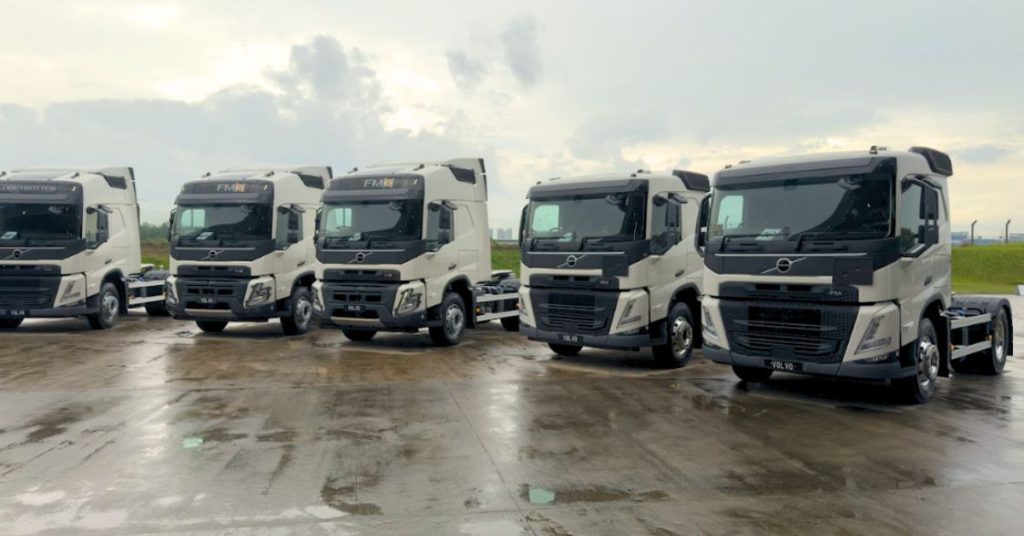
Malaysia’s logistics sector is thriving, ranking 26th globally in the 2023 World Bank Logistics Performance Index. Volvo’s updated trucks are tailored to the demands of this ecosystem, offering:
- Aerodynamic design: The Globetrotter cab enhances fuel efficiency by up to 9%.
- Cruise control with I-See: Smart cruise technology optimises speed and gear changes based on road topography.
- Euro 5 compliance: Meeting international emission standards, the trucks support businesses striving for sustainability goals.
These features could be game-changers in helping businesses deliver goods more efficiently while reducing costs and emissions. Not only that, it also aligns with Malaysia’s Low Carbon Mobility Blueprint 2021-2030, a policy framework for reducing greenhouse gas emissions in the transport sector.
Enhancing driver well-being
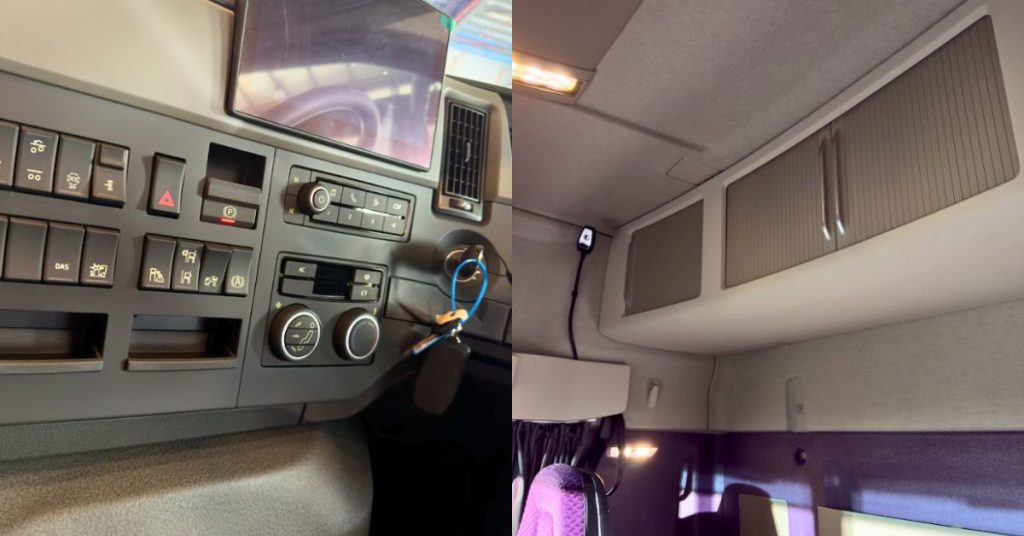
Truck drivers are vital economic frontliners, and Volvo Trucks has also prioritised their well-being. The newly designed cabins feature:
- Ergonomic controls and intuitive interfaces to minimise fatigue
- Spacious resting areas for improved comfort on long-haul drives
- Enhanced audio systems and USB-C ports for modern connectivity needs
These upgrades aim to provide drivers with a productive and comfortable environment, contributing to safer and more efficient operations.

Supporting the industry
Volvo Trucks is also investing in driver training to ensure operators can maximise the benefits of the new trucks. Additionally, its Iron Women Programme, launched in 2024, aims to upskill and empower women to become heavy-duty truck drivers. Five women have already graduated, with plans to train 100 women by the end of 2025.
Volvo Trucks continues to set benchmarks in safety, recently earning a five-star rating from Euro NCAP for its Volvo FH and FM models. This recognition underscores its position as a leader in innovative and reliable heavy-duty truck solutions.
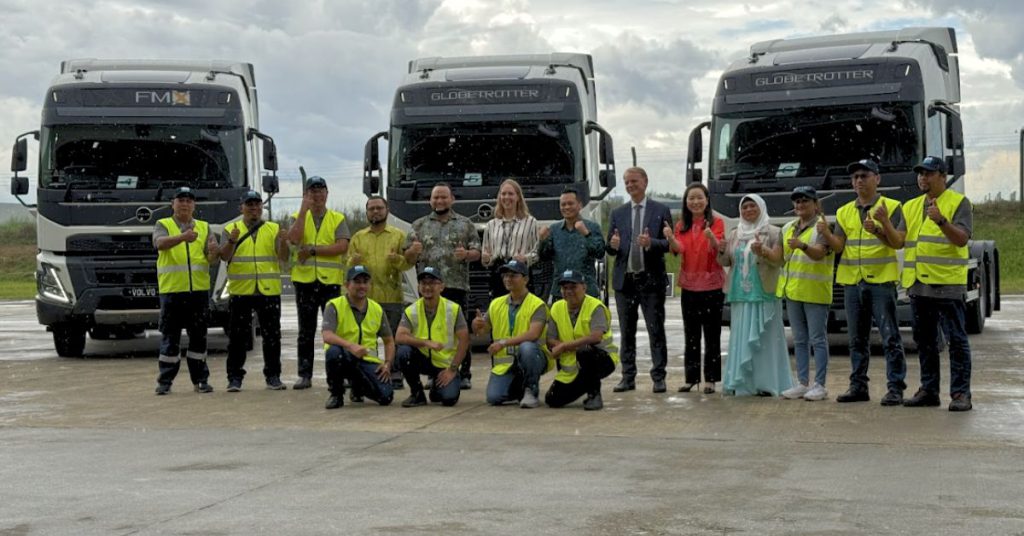
Trucks don’t usually get the spotlight when we think about innovation or sustainability. But Volvo’s latest heavy-duty trucks might have just represented a technological leap and also a commitment to a better, greener tomorrow for Malaysia’s transport industry.
Also Read: Mega sales are coming up in M’sia, here’s how to ensure that your parcels don’t go missing
Featured Image Credit: Vulcan Post

